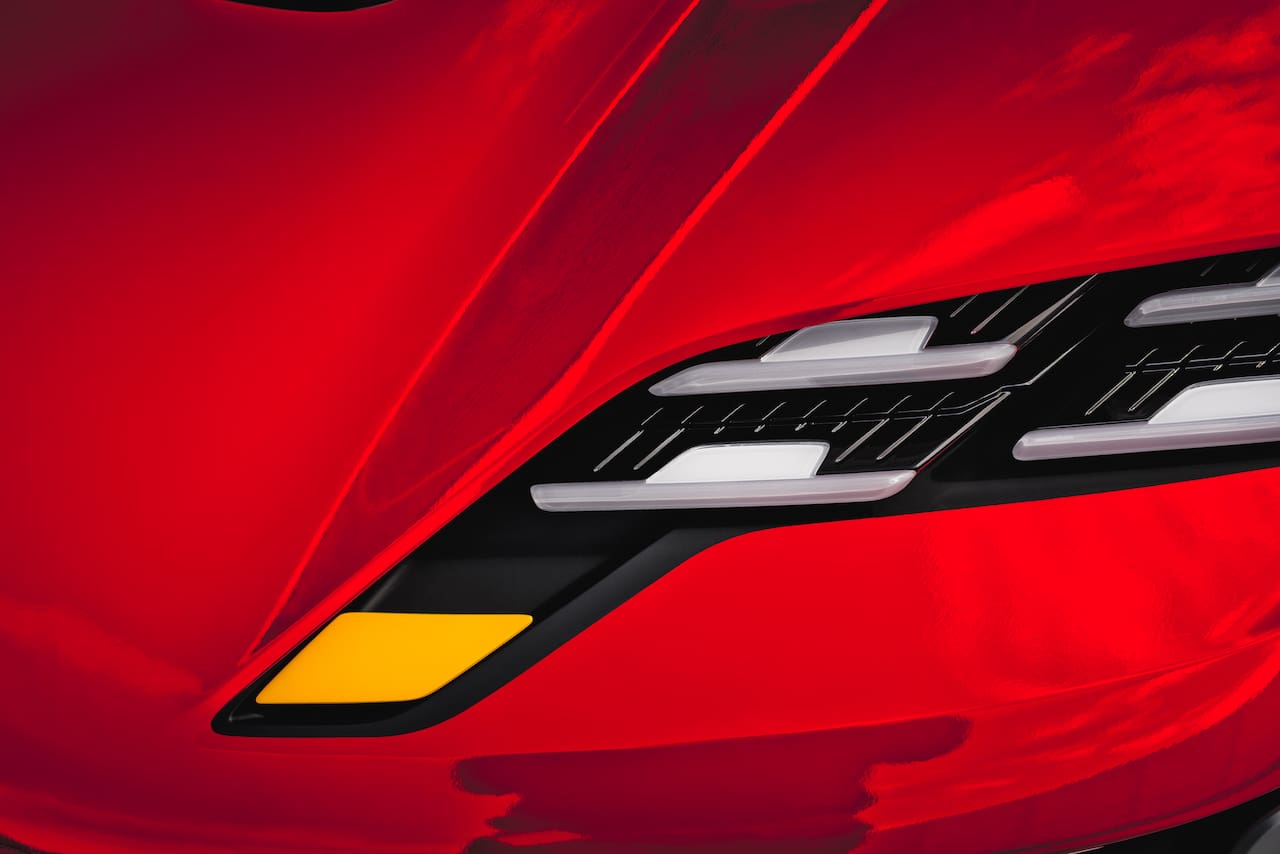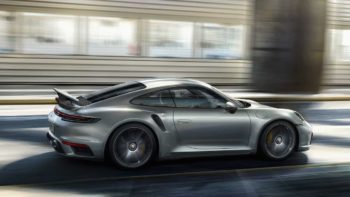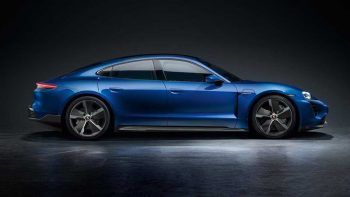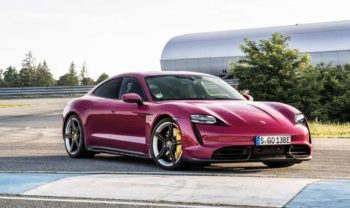A new Porsche EV will debut at the 2021 Munich Motor Show (IAA 2021) on 6 September 2021. There are good chances that this is a Porsche Boxster EV concept.
Porsche has released a teaser of the upcoming EV concept that reveals small details. The four-eyed headlights are similar to that of the Porsche Taycan. However, they have a sharper design and appear to be smaller. The separate turn indicator is another noteworthy difference in this case. The compact drive components should allow positioning the bonnet lower than on conventional Porsche sports cars. The bonnet appears to have a central vent, which could allow the air from the intake on the front bumper to pass through, thus generating downforce over the front axle.
A Porsche Boxster concept was hinted in May
In May 2021, a report from Car And Driver suggested that an all-electric Porsche Boxster may not be too far from breaking cover, though in a concept form. The report said that Dr. Michael Steiner, Member of the Executive Board for Research and Development, Porsche, is pushing to develop a Porsche Boxster electric concept.
Two-door electric Porsche models have long been thought of as products of the distant future. However, Volkswagen Group’s accelerated electrification strategy could mean at least the entry-level models like the Boxster adopting electric power sooner than expected.
According to the report, Dr. Steiner has said that the company has built electric prototypes of the current-gen Boxster, although it’s doubtful that a launch is planned in the immediate future. These prototypes are too heavy. An all-electric Boxster could be a part of the next-gen family. By that time, Volkswagen Group would have lighter and more efficient battery packs with its unified cell platform ready. The Zuffenhausen-based automaker had said last year that its electric sports cars would ride on a new, yet-to-be-announced vehicle platform, and so, PPE and J1 probably aren’t the right solutions for this product.
Some of Porsche’s two-door electric cars, like an all-electric 991, could be among the 20% models in which Volkswagen Group sees the need for a special battery cell technology instead of unified cell. “With this concept (unified cell), we are really able to put 80% unified cell in our cars,” Thomas Schmall, Board Member Technology, Volkswagen Group, said at Volkswagen Group’s Power Day event in March. “(As for the remaining) 20%, for sure a big OEM like Volkswagen (Group) needs specific solution independent from the cell design,” he added.
Porsche’s battery cell tech to be developed with Motorsport
Porsche CEO Oliver Blume indicated at the Power Day event that the battery cell technology for two-door EVs will be developed with the help of its motorsport division. He said:
Motorsport has always been a development laboratory for Porsche. Things that have been proven on the racetrack are later incorporated in the production. This is an integral part of the Porsche DNA. We have also transferred this principle to the development of our fully electric production sports cars.
Porsche CEO Oliver Blume (Volkswagen Group Power Day)
Further, Blume said that Porsche’s goal must be to ensure a permanent supply of high-performance cells that fully satisfy its specific requirements for future electrified race cars and electric super sports cars. “We must design them (battery cells) for our very specific purposes as high-performance cells,” Blume said.
Porsche will systematically build up know-how in the area of high-performance chemistry. We will ensure that there is a completely European production chain for high-performance batteries. These are intended for use in high-performance limited-production-run cars and in customer motorsport. As carryover effect, also volume and power cells will benefit from this technology experience.
Porsche CEO Oliver Blume (Volkswagen Group Power Day)
Porsche testing electrified Boxsters in internal projects
Last year, talking to CAR, Dr. Steiner had said that though the company is testing electrified Boxsters to gain knowledge, a production decision is not taken yet. Porsche feels that the Boxster being a small sports car, will not be the right choice for big batteries as it will affect the handling. This is why Porsche’s next electric vehicle will be a small SUV and not a sports car. Porsche will be launching an electric crossover based on the Volkswagen Group’s Premium Platform Electric (PPE) architecture as its second electric vehicle, akin to the Macan.
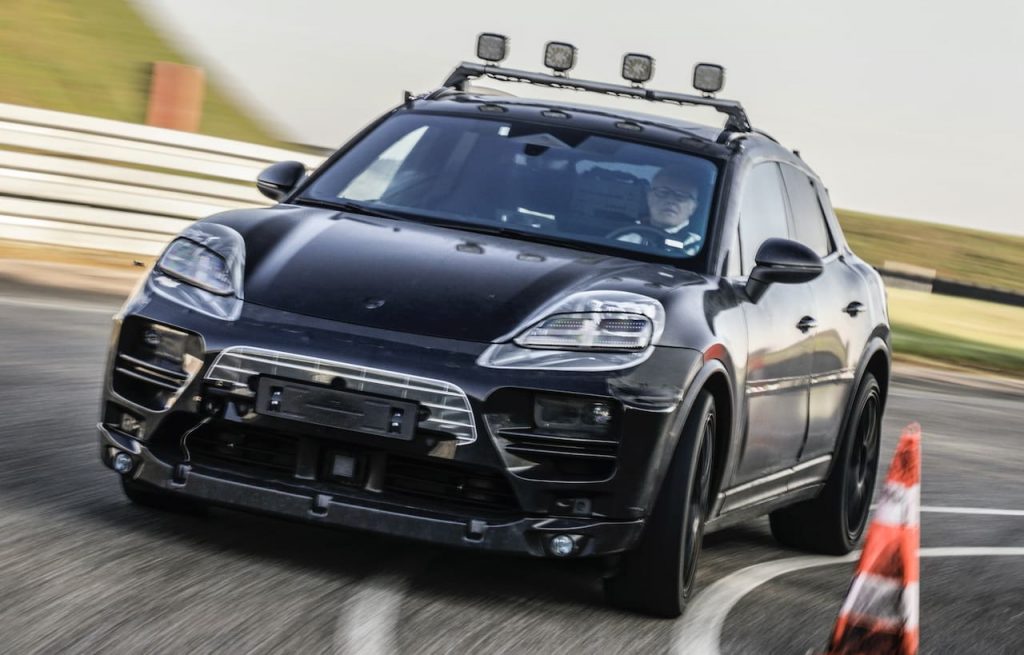
Dr. Steiner has said that if there’s a significant breakthrough with battery technology like solid-state batteries, Porsche will surely move in the direction of a two-door fully electric sports car. However, those who are expecting a fully electric Porsche 911, get ready for disappointment. Talking about the electrification of its cars, Blume has stated that 50 percent of Porsche vehicles will get an electric or hybrid drive by 2025 and Porsche will continue to offer combustion engines, especially in the 911.
Porsche has already launched its fully electric four-door sports car Taycan globally. The Taycan can be specified with a battery pack having energy content as much as 93.4 kWh (gross), which is good enough for a maximum range of 484 km (WLTP). With a 270 kW rapid charger, the battery pack can be charged to 80% in just 22.5 minutes, and Customers can achieve a 100 km range of charge in five minutes. In true Porsche style, the Taycan can accelerate from 0 to 100 km/h as quickly as 2.8 seconds and achieve a top speed of 260 km/h.
80 percent of Porsches to be electrified by 2030
In its annual press conference in March, Porsche announced that by 2030, 80% of new Porsche cars sold would be electrified, either as all-electric vehicles or high-performance plug-in hybrids. In 2020, a third of Porsche cars sold in Europe were fully or partially electric; globally, it was 17 percent. In 2025, 50 percent of all new Porsches sold worldwide will have an electric motor, the company said.
Solid-state battery is the “end game”
The development of solid-state battery cell technology is expected to mark the beginning of the next revolution in the auto industry when it comes to electrification. With higher energy density, greater safety, faster charging, and lower space requirements, it checks all the boxes for fully electrifying sports cars. “This is the end game for Lithium-ion battery cells,” Frank Blome, Head of Battery Cell and System, Volkswagen Group Components, said at the Power Day event.
Volkswagen Group has partnered with QuantumScape to develop solid-state battery cell technology for EVs. Blome said that QuantumScape is already able to reduce the 10-80% SoC fast-charging time from the current battery cell technology’s 20-35 minutes all the way down to 12 minutes with solid-state battery cell technology.
Featured image: Twitter/Porsche Newsroom
